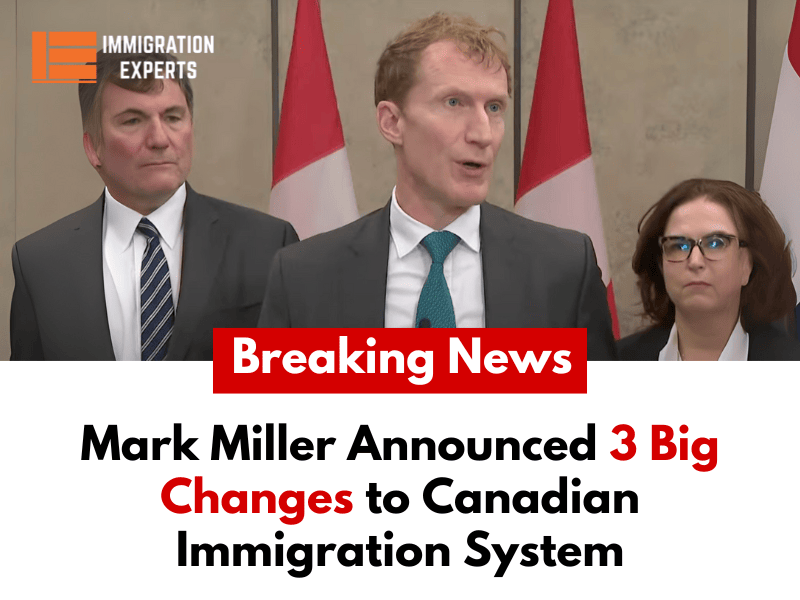051 8439995, 042 35911332

The Immigration, Refugees, and Citizenship Canada (IRCC) Minister Marc Miller announced significant changes to Canada’s immigration laws on December 17, 2024. These adjustments are intended to increase efficiency, fortify security, and promote equity in the management of migration, especially in light of difficulties at the U.S. border.
Marc Miller also alluded to the elimination of the Express Entry system’s LMIA-based job offer points. This update is consistent with previous November 2024 reports.
A thorough summary of these modifications and their possible effects may be seen below.
Things You Will Find In This Page
1. Closing “Flagpoling” to Improve Border Management
Eliminating the practice of “flagpole,” in which temporary residents leave Canada and re-enter through a port of entry to speed up immigration processing, is a crucial reform.
Marc Miller underlined that flagpole hinders enforcement efforts, divert vital border resources, and interferes with cross-border movement.
To prolong their stay in Canada, temporary residents will now have to apply online. This strategy seeks to ensure more efficient use of resources while reducing the workload for border officers.
2. Improving Immigration Documents Oversight
The government has suggested amending the Immigration and Refugee Protection Act to improve the legitimacy and safety of Canada’s immigration system.
With these modifications, Immigration, Refugees and Citizenship Canada (IRCC) would have more authority to:
- Cancel, suspend, or modify immigration documents, such as visas, in cases involving fraud or security risks.
- Temporarily halt or refuse applications in the public interest, such as during widespread fraudulent activity.
These measures are designed to prevent security risks, uphold public safety, and better protect Canada’s resources.
3. Tackling LMIA Fraud and Enhancing Express Entry Integrity
Reforms to the Express Entry system aim to reduce fraudulent activities and maintain fairness, reinforcing earlier reports from November 22, 2024.
One of the major updates is the removal of extra points for job offers under Express Entry. By doing so, the government intends to:
- Minimize the misuse of Labour Market Impact Assessments (LMIAs) for immigration purposes.
- Promote greater fairness and integrity within the Express Entry system.
These changes signify a robust approach to tackling immigration fraud while ensuring transparency in Canada’s immigration programs.

Measures to Address Irregular Migration
The Canadian government remains firmly committed to ensuring safe and orderly migration, as highlighted by the immigration minister.
Under the Safe Third Country Agreement (STCA), asylum seekers are required to claim refugee status in the first safe country they enter—either Canada or the United States.
The agreement, expanded in March 2023 to cover the entire land border, including waterways like the Great Lakes, has significantly reduced irregular migration.
Key Outcomes:
- Irregular border crossings into Canada dropped from an average of 165 per day in March 2023 to just 12 per day after the enhanced border measures were introduced.
- The partial visa requirement for Mexican nationals, implemented in February 2024, led to a 92% decrease in asylum claims from Mexican citizens compared to 2023.
Strengthening International Collaboration
To further enhance border security and mitigate risks, Canada is working closely with the United States on several initiatives, including:
- Improving mechanisms for information sharing.
- Strengthening the vetting processes for electronic travel authorization (eTA).
- Proposing the creation of a North American Joint Strike Force to combat transnational organized crime.
Additionally, the government is setting up three regional hubs where federal, provincial, and local law enforcement agencies will work together to intercept organized crime and combat illegal drug trafficking more effectively.
Legislative Changes to Safeguard Public Interest
In response to exceptional circumstances such as widespread fraud, proposed legislative amendments will empower Immigration, Refugees and Citizenship Canada (IRCC) to take decisive actions, including:
- Suspending or canceling applications and immigration documents.
- Rapidly implementing measures to protect the integrity of Canada’s immigration system.
Results of the Government’s Efforts
The following statistics demonstrate the effectiveness of these measures:
- Mexican Asylum Claims: Claims decreased by 97% after the introduction of partial visa requirements for Mexican nationals.
- Irregular Crossings: Illegal crossings by Canadian visa holders into the U.S. declined by 84% since June 2024.
- Visa Refusal Rates: For countries with high rates of visa abuse, refusal rates have reached 61%.
These outcomes highlight the success of the government’s strategies in addressing irregular migration and preventing visa exploitation.
A Message to Asylum Seekers
Minister Marc Miller issued a strong warning about the dangers of attempting irregular entry into Canada, particularly during harsh winter conditions. Such attempts not only pose significant risks to personal safety but are also likely to result in asylum claims being deemed inadmissible.
The government remains dedicated to maintaining a humane and efficient asylum system while taking necessary measures to safeguard Canada’s borders from illegal activities.
Looking Forward
The reforms announced by Marc Miller represent a critical step in modernizing Canada’s immigration system. By focusing on border security, fraud prevention, and streamlined asylum processes, these measures reflect Canada’s commitment to a fair and efficient immigration framework.
These changes are expected to strengthen Canada’s reputation as a leading destination for immigrants seeking a better future while enhancing collaboration with the United States and other global partners.
As the new policies take effect, they will play a pivotal role in preserving the integrity of Canada’s immigration system and ensuring its long-term success.
